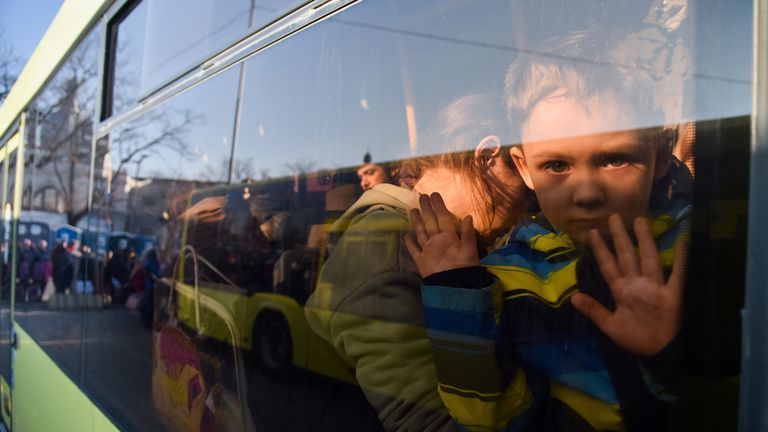Cutting Ukrainian refugee funding 'short-sighted' and must be 'urgently reviewed', Gove told
Michael Gove announced earlier this month that councils will receive £5,900 - down from £10,500 - for each Ukrainian refugee who arrives in their area, but the plans have been met with backlash.
Saturday 24 December 2022 00:18, UK
The plan to slash local authority funding to house Ukrainian refugees is "short-sighted" and must be "urgently reviewed", the government has been told.
Michael Gove, the communities secretary, announced earlier this month that councils will receive £5,900 - down from £10,500 - for each Ukrainian refugee who arrives in their area.
He said this was due to "wider pressures on the public finances", but announced that the payments going to individuals who host people fleeing the war will rise.
However, ministers in the devolved governments have written to Mr Gove calling for a meeting and re-think of the policy.
Scottish Ukraine minister, Neil Gray, and Welsh social justice minister, Jane Hutt, said in their letter: "The changes announced amount to a reduction in funding available to help people fleeing Putin's illegal war in Ukraine settle into a new home.
"In the face of continued and acute need, it is counter-productive and short-sighted to cut vital funding available to deliver public services to the most vulnerable."
The ministers said local authorities are "under extreme and unacceptable pressure during an unprecedented cost of living crisis".
They said the decision undermines "the success of this safe and legal route to the UK" and is at "odds with recent UK government claims about a generous approach".
Read More:
What has happened to the refugees taken in under the UK's Homes for Ukraine scheme?
More than 100,000 Ukrainian nationals have arrived in the UK under the government's Homes for Ukraine scheme.
This was launched earlier this year and allows Ukrainians fleeing the war with Russia to come to the UK if a sponsor agrees to provide accommodation for at least six months.
At the moment, councils receive £10,500 for every Ukrainian to support them and their sponsor, but this will change in January when the money is cut by almost half.
While council funding has been cut, the money given to individuals who take in Ukrainian refugees will rise from £350 to £500 a month after the first year of hosting.
Mr Gove also announced a £500m fund aimed at allowing councils in England to buy up housing stock for the use of refugees, which is expected to provide up to 4,000 homes.
A government spokesperson said: "We are grateful to all sponsors who have opened their homes to Ukrainians.
"We understand they may be concerned about rising costs, which is why we have increased thank you payments to £500 a month, once the guest has been in the UK for a year.
"Councils have received £1.1bn through the Homes for Ukraine scheme, so they can support arrivals, and they have a duty to ensure families are not left without a roof over their heads.
"Ministers and officials meet regularly with their counterparts in the devolved governments, and we will continue to work closely with them to ensure Ukrainians and their hosts have the support they need."
Addressing the funding increases, the ministers said the £500 payments should start immediately rather than after 12 months, adding that the devolved nations do not have the "fiscal headroom" to offer similar funds to local authorities to buy up housing stock.
"We therefore ask that you urgently revisit this decision, which was made without appropriate consultation and engagement with devolved governments, and to meet with us quickly to find a more effective way forward," the ministers concluded.




